常见首字母填空单词
历年中考首字母填空高频单词汇总

历年中考首字母填空高频单词汇总1.副词:在句中常见的有already。
also。
almost。
always,而在句尾常见的则有again。
accurately。
altogether。
alone。
2.连词:常见的连词包括after。
and。
as。
although等。
3.介词:常用的介词有around。
among。
across。
along。
about。
above。
after。
against。
as等。
4.动词:常见的动词包括achieve/get/gain/receive。
afford (afford to do )。
agree。
answer。
allow。
appear。
award等。
5.代词:代词分为多种类型,如anything。
anybody。
all。
another。
any等;both;everybody。
everything。
either。
each 等;somebody。
something等;nothing。
nobody。
XXX等;还有others,other,one(s)等。
1.连词:常见的连词有but。
because。
before等。
2.介词:常用的介词包括besides。
beside/next to。
below。
behind。
before。
een等。
3.动词:常见的动词有begin/start。
e。
believe。
blow。
book。
break。
borrow等。
4.形容词:常用的形容词有beautiful/pretty。
brave。
brief。
better/best,busy,XXX等。
1.动词:常见的动词包括cost。
control。
close。
continue。
correct。
XXX。
complain。
confuse。
called,catch/know/understand等。
End everything with a smile。
That's the best way to XXX it's an exam。
综合填空单词高频词
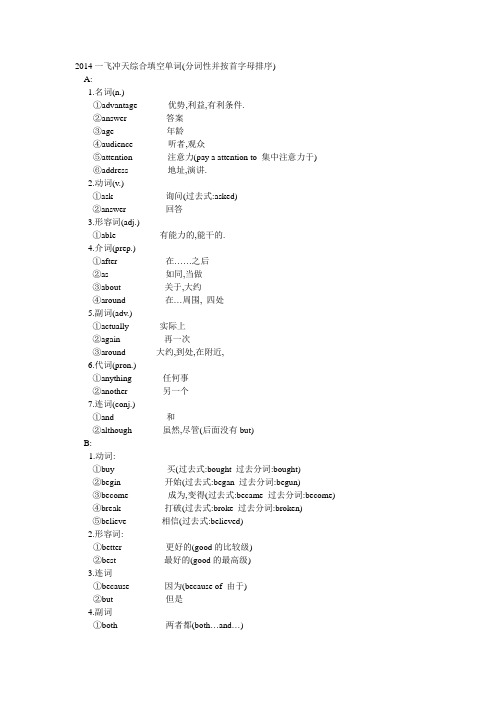
2014一飞冲天综合填空单词(分词性并按首字母排序)A:1.名词(n.)①advantage 优势,利益,有利条件.②answer 答案③age 年龄④audience 听者,观众⑤attention 注意力(pay a attention to 集中注意力于)⑥address 地址,演讲.2.动词(v.)①ask 询问(过去式:asked)②answer 回答3.形容词(adj.)①able 有能力的,能干的.4.介词(prep.)①after 在……之后②as 如同,当做③about 关于,大约④around 在…周围, 四处5.副词(adv.)①actually 实际上②again 再一次③around 大约,到处,在附近,6.代词(pron.)①anything 任何事②another 另一个7.连词(conj.)①and 和②although 虽然,尽管(后面没有but)B:1.动词:①buy 买(过去式:bought 过去分词:bought)②begin 开始(过去式:began 过去分词:begun)③become 成为,变得(过去式:became 过去分词:become)④break 打破(过去式:broke 过去分词:broken)⑤believe 相信(过去式:believed)2.形容词:①better 更好的(good的比较级)②best 最好的(good的最高级)3.连词①because 因为(because of 由于)②but 但是4.副词①both 两者都(both…and…)5.介词①before 在….之前C:1.名词①collection 收集②class 班级,课(可数)2.动词①come 来(过去式:came 过去分词:come)②collect 收集(过去式:collected)③cost 花费(过去式:cost 过去分词:cost)④can 能(过去式:could. Could用于从句中表语气委婉而不是can的过去式)⑤close 关闭(过去式:closed)⑥carry 拿⑦correct 改正⑧change 改变(过去式:changed)⑨call 呼叫(过去式:called)3.形容词①close 亲近的②careful 认真的,仔细的(副词形式:carefully)D:1.名词①day 天(可数)2.形容词①different 不同的②deep 深得③difficult 困难的3.介词①down 向下的E:1.名词①education 教育2.动词①explore 探索②eat 吃(过去式:ate 过去分词:eaten)3.形容词①easy 简单的②exciting 令人兴奋的(修饰物)excited (修饰人)③enough 充足的④empty 空的⑤else 其他的4.副词①early 早②even 甚至5.代词①each 每个②every 每一个③everything 每件事F:1.名词①family 家庭,家人②friend 朋友③floor 地板2.动词①feel 感觉(过去式:felt 过去分词:felt)②find 寻找,发现(过去式:found 过去分词:found)③finish 完成④forget 忘记(过去式:forgot 过去分词:forgotten)3.形容词①familiar 熟悉的②full 充满的③foreign 外国的4.副词①first 首先G:1.名词①group 组2.动词①get 得到,变得(过去式:got 过去分词:got)H:1.名词①height 高度②holiday 假期③home 家2.动词①help 帮助(过去式:helped)②have 有<表示人有>(过去式:had 过去分词:had)③happen 发生3.形容词①hard 努力的②happy 开心的4.副词①hard 困难地5.连词①how 怎么6.代词①him 他(宾格)I:1.名词①idea 办法,方法2.动词①is 是(过去式:was 过去分词:been)②improve 提高(过去式:improved)③instead 代替3.形容词①important 重要的②ill 生病的③interesting 有趣的(修饰物)Interested 有趣的(修饰人)④impossible 不可能的4.代词①it 它(主格)Its 它的(形容词性物主代词)5.介词①in 在….上,在…里②into 进, 在…里K:1.动词①knock 敲②know 知道③keep 保持(后加doing)L:1.名词①life 生活,生命②leave 叶子(可数)③land 地,陆地,地面2.动词①last 持续②like 喜欢(过去式:liked)③leave 离开(过去式:left 过去分词:left)④lie 躺,说谎(过去式:lay过去分词:lain)⑤listen 听⑥love 爱⑦lose 浪费,失败(过去式:lost 过去分词:lost)3.形容词①last 最新的②left 左边的③low 低的④large 大的4.副词①last 上次②later 后来③lucky 幸运地M:1.名词①mountain 山②matter 问题,麻烦③message 信息2.动词①mean 意味②mention 提及③make 做(make do.使某人怎样:make sb形容词.)[过去式:made过去分词:made]④may/might 可能3.形容词①main 主要的②more 更多的③most 大多数的,最多的,④million 百万的5.副词①most 最……②much 非常6.代词①my 我的(主格)[反身代词:myself 宾格:me名词性物主代词:mine ]N:1.代词①nobody 没有人②none 没有人2.形容词①none 没有的(none of)3.副词①never 从来不O:1.名词①office 办公室2.形容词①only 唯一的4.副词①only 只有,仅②out 不流行的,落伍的5.代词①other 其他人②one 一个人6.介词①on 在7.连词①or 或者,否则P:1.名词①paper 纸②problem 问题③patent 父母(加s指父母双方,不加s指父母其中一人)④place 地方2.动词①play 玩,扮演,播放……(过去式played 过去分词 played)②put 拿(过去式 put 过去分词 put)③pick 拾起,捡起(过去式 picked 过去分词 picked)④practise 练习(过去式practised 过去分词practised)[practise+doing]⑤punish 惩罚Q:1.形容词①quick 迅速的②quiet 安静的2.副词①quickly 迅速地②quite 非常R:1.名词①river 河②result 结果2.动词①realize 认识②remember 记得3.形容词①recent 最近的②right 对的,右边的S:1.名词①subject 学科②soldier 军人③store 商店,仓库,储备2.动词①stop 停止(过去式:stopped)②seem 看起来③sit 坐( sit down 坐下)④suggest 建议⑤study 学习⑥spend 花费(过去式spent过去分词:spent )<花费时间: 主语+spend+时间+(in) doing sth 花费钱: spend on >⑦sell 卖(sell out 卖光)[过去式:sold 过去分词:sold]⑧start 开始⑨speak 说(过去式:spoke过去分词:spoken)⑩satisfy 满意,高兴,使满意(过去式satisfied 过去分词satisfied)⑪shop 购物3.形容词①special 特殊的②strange 陌生的4.连词①so 所以5.sorry 抱歉T:1.名词①trip 旅行②time 时间③trouble 麻烦④tool 工具2.动词①teach 教(过去式:taught 过去分词:taught)②throw 扔(过去式:threw过去分词:thrown)③think 认为.想(过去式:thought过去分词:thought)④try 尝试(过去式:tried 过去分词:tried)3.介词①to 到..像..(一般后接动词原形。
中考英语首字母填空高频单词汇总

A—Z首字母高频A开头单词高频副词:句中: already also almost always句尾:again alone连词: after and as although介词: around among across along aboutabove after against as动词: afford (afford todo ) agree answer allow appear award 得到:achieve/get/gain/receive代词:a. anything anybody all another anyb. bothc. everybody/everything/either/eachs. somebody/somethingn. nothing/nobody/neither/noneo. others other one(s)B开头单词高频连词: but because before介词: besides beside/next to below behind before between动词: begin/start become believe blow book break borrow形容词:beautiful/pretty brave brief better/best busy聪明:bright/clever/smart/wiseC 开头单词高频动词:change sth to sth choose to do sth confuse calledcatch/know/understand cause sb./sth. to docheck v./n. close continue correct v. 纠正complete/finish complain connect…to/withcompare…with… cost control形容词:careful(carefully) careless correct common crazy cheap convenient confident clear comfortable cold clever一定的:certain/sure be ……to do 一定去做某事正确:right true correct real名词:chance choice corner culture/customD开头单词高频动词:decide dislike/hate develop discover drive(驱赶) discuss disappear毁坏,破坏damage/destroy/hurt/wound形容词:different(difference) difficult dull/boring dishonest deaf dangerous devel oping--developed名词:make adecision/suggestion dream/ambition duty diet day danger darknes s介词: duringE开头单词高频副词:even/ever exactly easily everywhere enough especially形容词:early/earlier easy elder empty excited expensiveelse(what/who…else anything/nothing else)好的: excellent/perfect/nice/fine/good/great/wonderful动词:解释,回答:explain/answer/say/suggest检查: examine/check enjoy encourage sb. to do endn./v. escape 希望:expect/wish/hope介词:except名词:end everything/bodyexercise(s) experience(s) example测试:exam/quiz/competition/contestF开头单词高频名词: fun friendship form freedom flight种类: form type kind动词: forget follow find finish/complete fail发现:find/discover/notice/learn/realize副词: far(farther, farthest) fast finally first forward介词: from形容词:first friendly favorite few funny好的fine/well/nice following frightened/afraidG开头单词高频形容词:好的:good/great 开心的glad/pleased/happy/satisfied温柔的gentle 大方的generous动词: grow guess go give得到 get gain achieve receive名词: goal game group guide副词:gently generally greatlyH. 开头单词高频名词:habit hobby headache health hearthelp hope hour动词:happen hate help hesitate hide hurry希望 hope wish expect形容词:大 huge /giant / big largehomeless helpful hungry healthy harmful happy 副词:happily hard hardly连词: However howI. 开头单词高频名词:idea information importance副词:instead indeed/truly inside into immediately动词:introduce include improve形容词:impossible important impatient interesting/amusing连词:ifJ. 开头单词高频动词:join judge jump名词: journey judge裁判 joy---happiness路 journey way road副词: justK. 开头单词高频名词:key kind knowledge动词:keep know knockL 开头单词高频词动词:learn leave let lift(raise) live形容词:little/ less/ least local late lazy lucky large(big/ great) ★lonely(与alone 区别) lovely likely (be likely to do )= possible补充:可能 perhaps、possibly 、probably、maybe副词:later luckily介词:like (such as 与for example )M 开头单词高频词动词:miss 想念,错过 mean 意味着(show) meet 遇见,满足move 搬家 match 与……相配 mind 介意matter 要紧 makemake 相似单词:make、have、let +sb. do sth.cause / enable sb. to do sth.名词:market member method 方法(way/ solution)month manner(礼仪) message 信息(information)形容词:many/ much/ more/ most modernN 开头单词高频词动词:notice 注意到 need形容词:nervous 紧张的 new necessary 必要的(unnecessary) nice名词:nation news=message neighbor(neighborhood) notice代词:nothing nobody neither(either) none(all)副词:nearly never nearby扩展:紧张的nervous/worried好 nice pleasant good(better、best) great(greatly)well(形容词:身体好) excellent perfect wonderful国家 nation country state几乎 almost nearly发现 find notice discoverO 开头单词高频词动词: own offer order形容词:ordinary only own other outdoor副词:often once off over outside介词:over= throughout out outside连词:or常考的代词:(有时可做形容词用)other (all neither either both any eachevery another one/ones)P 开头单词高频词动词:promise pay play plan prevent prefer prepareprovide提供 process 加工 produce生产 prove 证明名词: pain performance place progress进步 process过程 practice 形容词: physical 身体的 patient (impatient) pretty powerful private (personal) public 公共的 pleased pleasant polite副词:possibly perhaps probably politely personally扩展:给give……to sb. offer……to sb.provide sb. with sth. provide sth. for sb.地方 place location addressQ开头单词高频词名词:question形容词:quiet quick副词:quickly quietly quiteR开头单词高频词动词:receive; realize; reach; remember; require; reduce; refuse; run; relax 形容词:real rich responsible right副词:really; recently; right; rather名词:reason; result; rest;S开头单词高频词动词:suppose; show; seem; suggest; share; spend; spread; start;名词: secret; story; shame = pity; sign; symbol; situation; somebody;形容词:serious; simple; special; soft; successful; strict; surprising; strange; Same similar副词:suddenly; slowly; still; seriously; sometimes; soon;seldomT开头单词高频词副词:tomorrow; tonight; today; too; then; there;together;terribly介词:till; to; towards; through; throughout;动词:turn; try; train; touch; teach; trouble;名词: trouble; team;teenager;tradition;形容词:tired; thirsty; thankful; thick; thin;terrible ;their;traditionalU开头单词高频词形容词: unusual; useful; unhappy; upset; unhealthy;介词:until; up; under;连词:until; unless;V开头单词高频词形容词:various动词: vary visitW开头单词高频词动词:waste; warn; work(运转;起作用); wonder(想知道); worry;形容词:wonderful; worse; wise; wrong; worried介词:with; without; within; 连词: what; whether; while;Y 开头单词高频词副词:yet; yesterday形容词:young名词: youth year以下是常用同义词整理:说:say; answer/ reply; suggest; explain; repeat; promise;种类:type; kind; form; 问题:problem; trouble; question;不同:different; various; 明白:understand; know; realize; find; learn;害怕的,担心的:fright/frightened/frightening, horrible, afraid, fearful 非常:very/rather/really/quite/terribly/completely/seriously准确的:accurate/correct/right/true达到,获得:get/gain/achieve/reach反对:against/ disagree年老的:elderly/old/aged几乎:almost/nearly尽管:though/although令人惊讶的:amazing/surprising志向/目标:ambition/goal/aim/dream/ task;有乐趣的:amusing/interesting回答/回复:answer/ reply进攻/袭击:attack/hit/beat奖品/奖励:award/prize前面:front/ahead好:good/great/nice/wonderful/excellent/perfect坏:bad/terrible/awful允许:allow/permit打电话:ring/ telephone/ call理解:understand/catch/follow困惑:confuse/puzzle可能:possible/perhaps/ probably/likely/maybe大:big/large/huge预订:order/book乏味的:boring/dull愚蠢的:foolish/silly/stupid聪明的:clever/smart/bright/wise/sensible一点:little/bit介意:mind/care检查:examine/check主管:charge/manage/responsible/duty主要的:chief/main干净的:clean/tidy冷:cold/freezing/frozen全部的:complete/whole/all会议:conference/meeting考虑:think/consider漂亮的:pretty/beautiful/cute/nice/每天的:everyday/daily黑的:dark/black争论:argue/debate投递:deliver/post值得:deserve/worth希望:desire/hope/wish/expect/prefer 掉下:drop/fall基本的:basic/elementary其它的:else/other/another/more 能:enable/can结束:end/finish喜欢:enjoy/like/love愉快的:enjoyable/pleasant理由:excuse/reason/cause练习:exercise/practice。
小学英语首字母填空练习题(及答案)
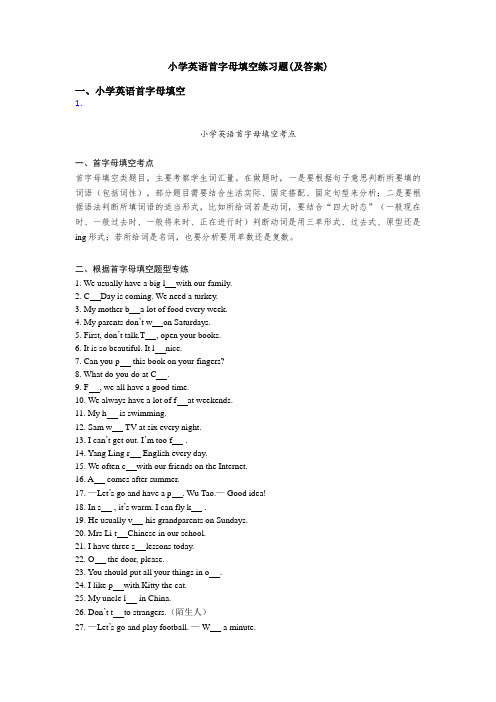
小学英语首字母填空练习题(及答案)一、小学英语首字母填空1.小学英语首字母填空考点一、首字母填空考点首字母填空类题目,主要考察学生词汇量。
在做题时,一是要根据句子意思判断所要填的词语(包括词性),部分题目需要结合生活实际、固定搭配、固定句型来分析;二是要根据语法判断所填词语的适当形式,比如所给词若是动词,要结合“四大时态”(一般现在时、一般过去时、一般将来时、正在进行时)判断动词是用三单形式、过去式、原型还是ing形式;若所给词是名词,也要分析要用单数还是复数。
二、根据首字母填空题型专练1. We usually have a big l with our family.2. C Day is coming. We need a turkey.3. My mother b a lot of food every week.4. My parents don’t w on Saturdays.5. First, don’t talk.T , open your books.6. It is so beautiful. It l nice.7. Can you p this book on your fingers?8. What do you do at C .9. F , we all have a good time.10. We always have a lot of f at weekends.11. My h is swimming.12. Sam w TV at six every night.13. I can’t get out. I’m too f .14. Yang Ling r English every day.15. We often c with our friends on the Internet.16. A comes after summer.17. —Let’s go and have a p . Wu Tao.— Good idea!18. In s , it’s warm. I can fly k .19. He usually v his grandparents on Sundays.20. Mrs Li t Chinese in our school.21. I have three s lessons today.22. O the door, please.23. You should put all your things in o .24. I like p with Kitty the cat.25. My uncle l in China.26. Don’t t to strangers.(陌生人)27. —Let’s go and play football. — W a minute.28. Let me send this e first.29. Mike is twelve y old.30. —What s does he like? —Maths.31. Does your aunt always w stories at home?32. We should a the policeman for help.33. The clothes f me very well.34. —What’s wrong with you? — I have a h .35. My sister is d a picture in the study.36. My mother is w the dishes now.2.arrives.inside all day.1. friendly2. children3. person4. size5. yours6. things7. in8. clean9. summer 10. every3.Man: Good morning. Can I help you?Boy: Yes, please. I want to b___1__ a walkman. I like listening to m__2____ very much.Man: Oh, I see. Look, this is a n___3___ one, I think. It’s 200 yuan. It’s a Japanese walkman. It’s very good.Boy: Oh, but I’d___4____ like it. Do you have C____5_____ walkmans?Man: Yes, we do.Boy: Can you s___6___ me that walkman?Man: Yes, h___7___ you are.Boy: Well, this walkman looks good. H____8__ m____9____ is it?Man: 100 yuan.Boy: Oh, sorry. I’m a s___10___ and I don’t ha ve much money.Man: How about this one? Only 50 yuan.Boy: That’s OK. I’ll take it.1.buy2.music3.new4.don’t5.Chinese6.show7.here8.How9.much 10.student4.A: Hello, Peter. How are you today? I hear(听说) you w__1_ well last week.B: I’m much better now. Thank you. Did you w_2__ the basketball game last night?A: Sure, I did. Great Lake Team w_3__ the game at last. Great Lake is my favorite team and David is my favorite basketball p__4__. He did really w__5_ in this game.B: I like him, too. Last Christmas I s_6_ him on TV with a baby in his arms.A: That was his daughter. She was only three months o_7_ then.B: So w__8__ did you get home last night?A: At about 9:30 and I went to bed at 10:00.B: I went to bed 20 minutes l_9_ than you.A: Why?B: Because I had the busiest and h_10_ birthday yesterday!1. weren’t2.watch3.won4.player5.well6.saw7.old8.whenter 10.happiest5.Will it matter if you don't take your breakfast? A short time a_1__, a test was given in the United States. People of different a_2_ from 12 to 83, were asked to have a test. During the test, these people were given all kinds of breakfasts and s_3_ they got no breakfast at all. Scientists wantedto see how well t_4_ bodies worked when they had different kinds of breakfasts.The results show that if a person e_5_a right breakfast, he or she will work better. If a student has fruit, eggs, bread and milk b_6_ going to school, he will learn more quickly a_7_ listen more carefully in class.The results a_8_ show that having no breakfast will not h_9__ you lose weight(体重). This is because people become so h__10__ at noon that they eat too much for lunch. So they will gain weight instead of losing weight.1.ago2.ages3.sometimes4. their5. eats6. before7. and8. also9. help 10. hungry6.Dear, Mary. We had a good time this summer holiday. You know I went to Nanjing to v (1) our relatives with my parents. The w (2) in Nanjing is hotter than that in Shanghai.My father's parents l (3) there.They are both over sixty years old,but they look very well.My grandmother c (4) nice food for us. My uncle has a son. My aunt is in Nanjing, too. She has a d (5). My father likes his niece very much.When I was in Nanjing, I played with my two c (7).On the last day there,all of u (8) went to the park and dinner t (9). Look at this photograph.We all have smiling f (10). Guess how many of us! Eleven.(1) visit (2) weather (3) live (4)cocked (5) daughter (6) cousins (7) happily (8) us (9) together (10) faces7.Kate: Hi, Mike! w (1) did you come back from Germany?Mike: Two days ago.Kate: How was your t (2)?Mike: It was wonderful. I had a good time.Kate: Oh, I like your s (3). Is it new?Mike: Yes. I g (4) it in Germany.Kate: I really like the colour. It l (5) good on you.Mike: Thank you.Kate: Father's Day is c (6). It's on the t (7) S (8) of J (9).I will send one just like y (10) to my father as a gift.Mike: Good.(1) when (2) trip (3) shirt (4) got (5) looks (6) coming (7) third(8) Sunday (9) June (10) yours8.John gets up early from Monday to S , because he must go to school before 7:30 on weekdays(工作日) and go to the D Club at 8:00 on Saturday mornings. He draws very well.He usually goes to the b to look at the new books on Saturday afternoons, and after supperhe watches TV until(直到) m . He doesn’t get up early on Sundays. John’s parents b work on Sundays. John always watches TV after he gets up. Then he usually goes to KFC to have ah and some juice for lunch. After that, he goes back home and b to play computer games until his parents come back. He does his homework after supper. He usually has a lot of w homework, so he must s three hours on it. He usually goes to bed at about 11:00 p.m. on Sundays. He often complains(抱怨) he has too m homework to do.Saturday ; Drawing ; bookshop ; midnight; both; hamburger; begins; weekend ; spend ; much二、完形填空9.完形填空根据上下文,选择适当的单词填空。
【小学英语】首字母填空训练经典题目(及答案)
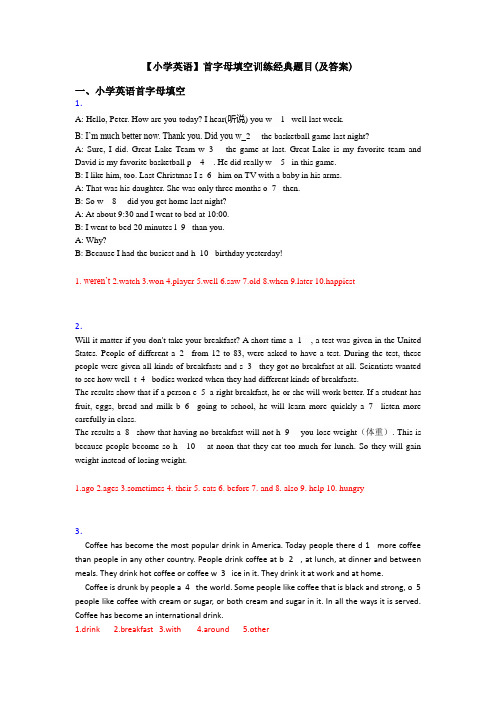
【小学英语】首字母填空训练经典题目(及答案)一、小学英语首字母填空1.A: Hello, Peter. How are you today? I hear(听说) you w__1_ well last week.B: I’m much better now. Thank you. Did you w_2__ the basketball game last night?A: Sure, I did. Great Lake Team w_3__ the game at last. Great Lake is my favorite team and David is my favorite basketball p__4__. He did really w__5_ in this game.B: I like him, too. Last Christmas I s_6_ him on TV with a baby in his arms.A: That was his daughter. She was only three months o_7_ then.B: So w__8__ did you get home last night?A: At about 9:30 and I went to bed at 10:00.B: I went to bed 20 minutes l_9_ than you.A: Why?B: Because I had the busiest and h_10_ birthday yesterday!1. weren’t2.watch3.won4.player5.well6.saw7.old8.whenter 10.happiest2.Will it matter if you don't take your breakfast? A short time a_1__, a test was given in the United States. People of different a_2_ from 12 to 83, were asked to have a test. During the test, these people were given all kinds of breakfasts and s_3_ they got no breakfast at all. Scientists wanted to see how well t_4_ bodies worked when they had different kinds of breakfasts.The results show that if a person e_5_a right breakfast, he or she will work better. If a student has fruit, eggs, bread and milk b_6_ going to school, he will learn more quickly a_7_ listen more carefully in class.The results a_8_ show that having no breakfast will not h_9__ you lose weight(体重). This is because people become so h__10__ at noon that they eat too much for lunch. So they will gain weight instead of losing weight.1.ago2.ages3.sometimes4. their5. eats6. before7. and8. also9. help 10. hungry3.Coffee has become the most popular drink in America. Today people there d 1 more coffee than people in any other country. People drink coffee at b 2 , at lunch, at dinner and between meals. They drink hot coffee or coffee w 3 ice in it. They drink it at work and at home.Coffee is drunk by people a 4 the world. Some people like coffee that is black and strong, o 5 people like coffee with cream or sugar, or both cream and sugar in it. In all the ways it is served. Coffee has become an international drink.1.drink2.breakfast3.with4.around5.other4.Hank lived in a small town, but then he found a job in a big city and moved there with his wife and his two children.On the first Saturday in their new house, Hank took his new red c 1 out the garage (车库) and began to wash it. A neighbour (邻居) stopped and said, "What a nice car! Is it yours?""Sometimes, " Hank answered.The neighbour was s 2 , "Sometimes? What do you mean?" "Well, " answered Hank, "When there's a party in the town, it's my d 3 . When there's a football game somewhere, it's my son's. When I've washed it, and it l 4 nice and clean, it's my wife's. And when it needs gas (汽油), it's m 5 . "1.car2.surprised3.daughter's4.looks5.mine5.One day as a teacher walked into the classroom, he heard a low voice: "Here is the teacher. I'm sure the unfair (不公平) fellow is going to talk about putting in commas (逗号). " It was Bill's voice. He was talking w 1 the boy next to him.The teacher didn't g 2 angry. He said n 3 about it but he began to talk about putting in commas, and then he wrote on the blackboard the sentence: " Bill says the teacher is an unfair fellow. "The class laughed and B 4 face turned red."Now," said the teacher, "I'll s 5 you how important commas are. "He put two commas in the sentence, and now read, "Bill, says the teacher, is an unfair fellow. " 1.with 2.get 3.nothing 4. Bill's 5.show6.There are many living things in the air. They can be bad f (1) our food. Some things,such as insects(昆虫), can be s (2) by us.O (3), like bacteria (细菌), can be seen only with microscope(显微镜).All living things n (4) water. We can k (5) some of our food by d (6) it. Living things can g (7) only at certain temperatures.We can also keep our feed by heating(加热) or c (8) it.We can keep some living things away f (9) our food by wrapping (包装)it.(1) for (2) seen (3) Others (4) need (5) keep (6) drying (7) grow (8) cooling (9) from7.Once there was an old Indian.He came to a farmer's house and asked for some d (1). The farmer told him to come in and sit down to dinner.There were a German and Frenchman too.The farmer said,"Well,you are the l (2) man to come.You shall serve the chicken."The I (3)agreed and a whore chicken was brought in.He c (4) off the head and gave it to the f (5), and said "You are the head man here.You shall have head." He gave the neck to the farmer's wife and said, "You are n (6) of head so you shall have the neck." "Each of the farmer's daughters was given a w (7)." "You will soon fly away from home and you each have a wing." He said to the Frenchman and the German, "You two p _8) fellows have a long way to go to get h (9)." and gave each of them a foot.Then he said, "I am just a poor old Indian beggar. I'll eat what l (10)."(1) dinner (2) last (3)Indian (4)cut (5) farmer (6) next (7) wing (8) poor (9) home (10) left8.It was a few days before C (1), so when the office c (2) at half past five, most of the young men and typists stayed and had a party. They a (3) and d (4),danced and s (5) songs, and nobody w (6) to go home..But Joe h (7)a wife at home ,and l (8) quite a long way from the city.Every few minutes he l (9) at his watch, and last, when it was very late, he b (10) to leave.'Joe!' shouted his friends. 'Are you leaving? W (11) don't you stay and e (12) the party?' 'I am not leaving,'s (13) Joe.'I am only going down to the station to m (14) the last train back home.I w (15) be back here in a few minutes.'(1)Christmas (2)closed (3)ate (4)drank (5)sang (6)wanted (7)had (8)lived (9)looked (10)began (11)Why (12)enjoy (13)said (14)miss (15)will二、完形填空9.完形填空完形填空It's Sunday today. It's cloudy and 1 .The 2 is blowing gently. There are many children in the park. Some are dancing 3 . Some are 4 bikes happily. There is a windmill in the park. It is moving 5 .1. A. wind B. windy C. cloud2. A. wind B. windy C. clouds3. A. easily B. happily C. heavily4. A. ride B. rides C. riding5. A. angrily B. strongly C. slowly【答案】(1)B;(2)A;(3)B;(4)C;(5)C;【考点】完型填空【解析】【分析】(1)根据所给的短文,cloudy多风的,是形容词,与并列的也是形容词,多风windy,故答案为B.(2)根据所给的短文,空后面的blowing gently轻轻地吹,是形容风的,做主语用名词,wind风,故答案为A.(3)根据所给的短文,空前面是谓语,修饰谓语动词用副词,dancing happily快乐的跳舞,故答案为B.(4)根据所给的短文,改空是谓语动词,ride bikes骑自行车,固定词组,本句是现在进行时,ride-riding,故答案为C.(5)根据所给的短文,公园里有一个风车。
上海中考英语-首字母填空高频词汇整理

上海中考英语-首字母填空高频词汇整理Shanghai High School Entrance Exam English - High Frequency Words Starting with A。
B。
and CA Words:Adverbs: already。
also。
almost。
alwaysEnd of sentence: again。
accurately。
altogether。
alonens: after。
and。
as。
althoughns: around。
among。
across。
along。
about。
above。
after。
againstVerbs: achieve。
get。
gain。
receive。
afford。
agree。
answer。
allow。
appear。
awardPronouns: anything。
anybody。
all。
another。
any。
both。
everybody。
everything。
either。
each。
somebody。
something。
nothing。
nobody。
neither。
none。
others。
other。
one(s)B Words:ns: but。
because。
beforens: besides。
beside/next to。
below。
behind。
before。
eenVerbs: begin/start。
e。
believe。
blow。
book。
break。
borrowAdjectives: beautiful/pretty。
brave。
brief。
better/best。
busyIntelligence: bright。
clever。
smart。
wiseC Words:Verbs: change sth to sth。
choose to do sth。
confuse。
called。
catch/know/understand。
cause sb./sth。
首字母填空技巧及练习
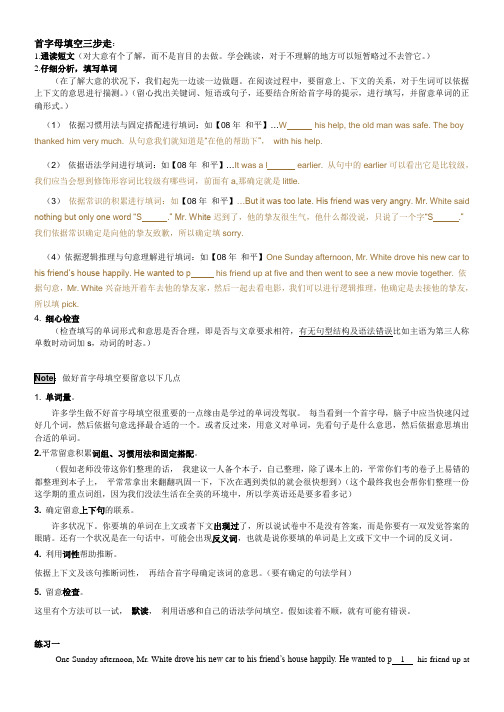
首字母填空三步走:1.通读短文(对大意有个了解,而不是盲目的去做。
学会跳读,对于不理解的地方可以短暂略过不去管它。
)2.仔细分析,填写单词(在了解大意的状况下,我们起先一边读一边做题。
在阅读过程中,要留意上、下文的关系,对于生词可以依据上下文的意思进行揣测。
)(留心找出关键词、短语或句子,还要结合所给首字母的提示,进行填写,并留意单词的正确形式。
)thanked him very much. 从句意我们就知道是“在他的帮助下”,with his help.(2)依据语法学问进行填词:如【08年和平】…It was a l earlier. 从句中的earlier可以看出它是比较级,我们应当会想到修饰形容词比较级有哪些词,前面有a,那确定就是little.(3)依据常识的积累进行填词:如【08年和平】…But it was too late. His friend was very angry. Mr. W hite said nothing but only one word “S.” Mr. White迟到了,他的挚友很生气,他什么都没说,只说了一个字“S.”我们依据常识确定是向他的挚友致歉,所以确定填sorry.(4)依据逻辑推理与句意理解进行填词:如【08年和平】One Sunday afternoon, Mr. White drove his new car to his friend’s house happily. He wanted to p his friend up at five and then went to see a new movie together. 依据句意,Mr. White兴奋地开着车去他的挚友家,然后一起去看电影,我们可以进行逻辑推理,他确定是去接他的挚友,所以填pick.4. 细心检查(检查填写的单词形式和意思是否合理,即是否与文章要求相符,有无句型结构及语法错误比如主语为第三人称单数时动词加s,动词的时态。
首字母填空高频单词
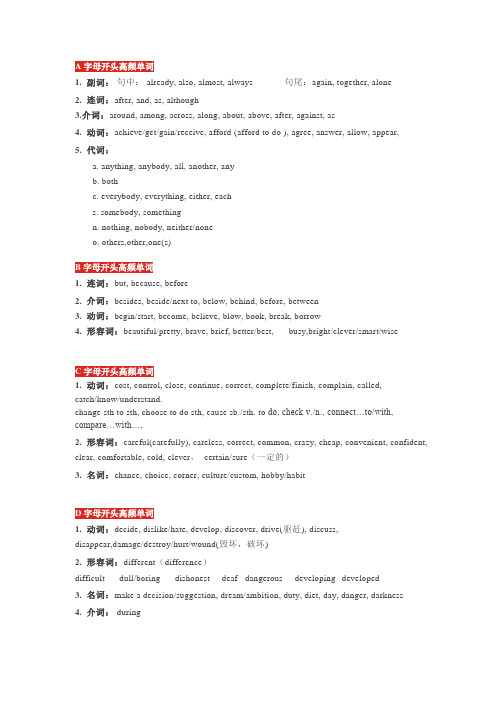
A字母开头高频单词1. 副词:句中: already, also, almost, always 句尾:again, together, alone2. 连词:after, and, as, although3.介词:around, among, across, along, about, above, after, against, as4. 动词:achieve/get/gain/receive, afford (afford to do ), agree, answer, allow, appear,5. 代词:a. anything, anybody, all, another, anyb. bothc. everybody, everything, either, eachs. somebody, somethingn. nothing, nobody, neither/noneo. others,other,one(s)B字母开头高频单词1. 连词:but, because, before2. 介词:besides, beside/next to, below, behind, before, between3. 动词:begin/start, become, believe, blow, book, break, borrow4. 形容词:beautiful/pretty, brave, brief, better/best, busy,bright/clever/smart/wiseC 字母开头高频单词1. 动词:cost, control, close, continue, correct, complete/finish, complain, called,catch/know/understand.change sth to sth, choose to do sth, cause sb./sth. to do, check v./n., connect…to/with, compare…with…,2. 形容词:careful(carefully), careless, correct, common, crazy, cheap, convenient, confident, clear, comfortable, cold, clever,certain/sure(一定的)3. 名词:chance, choice, corner, culture/custom, hobby/habitD字母开头高频单词1. 动词:decide, dislike/hate, develop, discover, drive(驱赶), discuss,disappear,damage/destroy/hurt/wound(毁坏,破坏)2. 形容词:different(difference)difficult dull/boring dishonest deaf dangerous developing--developed3. 名词:make a decision/suggestion, dream/ambition, duty, diet, day, danger, darkness4. 介词: duringE字母开头高频单词1. 副词:even/ever, exactly, easily, everywhere, enough, especially2.形容词:early/earlier, easy, elder, empty, excited,expensive, else(what/who…else anything/nothing else)好的:excellent/perfect/nice/fine/good/great/wonderful3. 动词:enjoy, escape, explain/answer/say/sugges, check, encourage sb. to do, end n./v., expect/wish/hope(希望)4. 介词: except5. 名词: end, everything/body, exam/quiz/competition, exercise(s), experience(s), exampleF字母开头高频单词1. 名词:fun, friendship, form, freedom, flight, form/type/kind(种类)2. 动词:forget follow find finish/complete fail 发现:find/discover/notice/learn/realize3. 副词: far(farther, farthest), fast, finally, first, forward4. 介词:from5. 形容词:first, friendly, favorite, few, funny, fine/well/nice, following, frightened/afraidG字母开头高频单词1. 形容词:good/great, glad/pleased/happy/satisfied, gentle(温柔的), generous(大方的)2. 动词:grow, guess, go, give, get/gain/achieve/receive(得到)3. 名词:goal, game, group, guide4. 副词: gently, generally, greatlyH字母开头高频单词1. 名词:habit, hobby, headache, health, heart, help, hope, hour, hope/wish/dream(希望)2. 动词:hope, happen, hate, help, hesitate, hide, hurry, hope/wish/expect(希望)3. 形容词:huge /giant / big/large, homeless, helpful, hungry, healthy, harmful, happy4. 副词: happily, hard, hardly5. 连词:However, howI字母开头高频单词1. 名词:idea, information, importance2. 副词:instead, indeed/truly, inside, into, immediately3. 动词:introduce, include, improve4. 形容词:impossible, important, impatient, interesting5. 连词:ifJ字母开头高频单词1. 动词:join, judge, jump,2. 名词:journey/way/road( 路), judge(裁判), joy3. 副词:justK字母开头高频单词1. 名词: key, kind of, knowledge2. 动词:keep, know, knockL字母开头高频单词1. 动词:learn, leave, let, lift(raise), live2. 形容词:little/ less/ least, local, late, lazy, lucky, large(big/ great), lonely, lovely, likely (be likely to do )= possible3. 副词:later luckily4. 介词:like (such as 与for example )M字母开头高频单词1. 动词:miss, mean, meet(遇见,满足), move(搬家) , match(与……相配), mind(介意), matter(要紧), make2. 名词:market, member, method(方法), month, manner(礼仪), message3. 形容词:many/ much/ more/ most modernN字母开头高频单词1. 动词:notice, need2. 形容词:nervous, new, necessary(必要的), nice3. 名词: nation, news=message, neighbor(neighborhood), notice4. 代词:nothing, nobody, neither(either), none(all)5. 副词: nearly, never, nearbyO 字母开头高频单词1. 动词:own, offer, order, ask2. 形容词:ordinary, only, own, other, outdoor3. 副词: often, once, of, over, outside4. 介词: over= throughout, out, outside5. 连词: orP字母开头高频词单1. 动词:promise, pay, play, plan, prevent, prefer, prepare, provide, process(加工),produce(生产), prove(证明)2. 名词: pain, performance, place, progress(进步), process(过程), practice3. 形容词: physical(身体的), patient(耐心的), pretty, powerful,private(personal), public, pleased, pleasant, polite4. 副词: possibly, perhaps, probably, politely, personallyQ字母开头高频单词1. 名词:question2. 形容词:quiet, quick3. 副词:quickly, quietly, quiteR字母开头高频单词1. 动词:receive, realize, reach, remember, require, reduce, refuse, run, relax2. 形容词:real, rich, responsible, right3. 副词:really, recently, right, rather4. 名词:reason, result, rest;S字母开头高频单词1. 动词:suppose, show, seem, suggest, share, spend, spread, start2. 名词:secret, story, shame = pity, sign, symbol, situation, somebody3. 形容词:serious, simple, special, soft, successful, strict, surprising, strange,same, similar4. 副词:suddenly, slowly, still, seriously, sometimes, soon, seldomT字母开头高频单词1. 副词:tomorrow, tonight, today, too, then, there, together, terribly2. 介词:till, to, towards, through, throughout3. 动词:turn, try, train, touch, teach, trouble4. 名词:trouble, team, teenager, tradition5. 形容词:tired, thirsty, thankful, thick, thin, terrible, their, traditionalU字母开头高频单词1. 形容词:unusual, useful, unhappy, upset, unhealthy2. 介词:until, up, under3. 连词:until, unlessV字母开头高频单词1. 形容词:various2. 动词:vary, visitW字母开头高频单词1. 动词:waste, warn, work(运转,起作用), wonder(想知道), worry2. 形容词:wonderful, worse, wise, wrong, worried3. 介词:with, without, within4. 连词:what, whether, whileY字母开头高频单词1. 副词:yet, yesterday2. 形容词:young3. 名词:youth, year。
- 1、下载文档前请自行甄别文档内容的完整性,平台不提供额外的编辑、内容补充、找答案等附加服务。
- 2、"仅部分预览"的文档,不可在线预览部分如存在完整性等问题,可反馈申请退款(可完整预览的文档不适用该条件!)。
- 3、如文档侵犯您的权益,请联系客服反馈,我们会尽快为您处理(人工客服工作时间:9:00-18:30)。
Number back men journey spent but again
Possible but seriously used sorry without trouble Hardly whether wise refused address hers followed Before planned except summer enjoying never hardly Though own pay needs end except greater
Cleaning right nothing lessons works especially average Flew on stories enjoyable rather before almost
Safe information unless right without alone leave According visit open of travelling perhaps person
Like because important choose good houses/homes ones Not about film really traditional complain way
Them means bus always less either daily
Little diseases exercise between milk less want
Show helps talking hurt ill secret light
Rest present stronger grew international only changed History readers hard know perhaps contest with
Shelves strong immediately for what able explained Provide little attractions what tunnel sometimes more Buses working off because even pay different
Without friendly also which receive artist wonderful
But thing won’t itself stopped even afraid
Bad even difference before off none growing
Better hope want about teachers’clothes harmful
Host itself daily even traditional out active
Cut same others different hundreds rain thirsty
Asks later talking first something believed good
Called certain chicken cold chemical clocks chicken’s Something makes properly bad weak food why
Badly worst off no wrote plan age
Like rains cool uses light strong nearly
Safe exciting still nothing alone singing remember/realize Picture activity their alone really talking communicate More hobbies until angry without interest changed。
